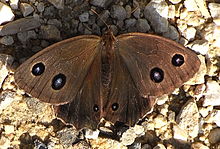Minois dryas, the dryad, is a butterfly of the family Nymphalidae.
| Minois dryas | |
|---|---|

| |
| Upperside | |

| |
| Underside | |
| Scientific classification | |
| Domain: | Eukaryota |
| Kingdom: | Animalia |
| Phylum: | Arthropoda |
| Class: | Insecta |
| Order: | Lepidoptera |
| Family: | Nymphalidae |
| Genus: | Minois |
| Species: | M. dryas
|
| Binomial name | |
| Minois dryas | |
Subspecies
editSubspecies include:[1]
- Minois dryas phaedra (Linnaeus, 1764) (southern Alps)[2]
- Minois dryas bipunctatus (Motschulsky, 1861) (Eastern Asia and Japan)
- Minois dryas septentrionalis (Wnukowsky, 1929)
- Minois dryas shaanxiensis (Qian)
Distribution and habitat
editThis species can be found in southern and central Europe up to central Asia and Japan.[3][1] It prefers margins of mixed woodland and sunny grasslands with plenty of flowers, at an elevation of 100–1,600 metres (330–5,250 ft) above sea level.[4][5]
Description
editThe wingspan is 54–70 millimetres (2.1–2.8 in).[4] The basic color of the upperside of the wings is dark brown. The females are larger and paler than the males. On each forewing there are two large eyelets with bluish pupils, while in each hindwing there is just a small eyelet. The underside of the wings is quite similar, but the eyelets on the forewings show a yellowish border and the hindwings are mainly gray brown.[5]
This species is rather similar to Satyrus actaea and Satyrus ferula. In the last one the forewing eyespots centered with white.[5]
-
Minois dryas ♂
-
Minois dryas ♂ △
-
Female
-
Male underside
-
Female underside
Biology
editThe butterfly is on wing from June to September[4] depending on the location. They usually feed on nectar of scabious (Scabiosa species), hemp agrimony (Eupatorium cannabinum) and other tall flowers.[5] The larvae feed on grass species, such as Molinia caerulea, Arrhenatherum elatius, Oryza sativa, Avena, Dactylis, Poa, Festuca, Carex, Calamagrostis and Bromus species.[1]
References
edit- ^ a b c "Minois Hübner, [1819]" at Markku Savela's Lepidoptera and Some Other Life Forms
- ^ Tom Tolman, Richard Lewington, Guide des papillons d'Europe et d'Afrique du Nord, Delachaux et Niestlé, 1999,2009 ISBN 978-2-603-01649-7
- ^ "Fauna europaea". Archived from the original on 2016-03-04. Retrieved 2017-02-17.
- ^ a b c Simon Coombes Captain's European Butterfly Guide Archived 2019-07-22 at the Wayback Machine
- ^ a b c d Euro Butterflies by Matt Rowlings
External links
edit- Lepiforum.de
- Paolo Mazzei, Daniel Morel, Raniero Panfili Moths and Butterflies of Europe and North Africa